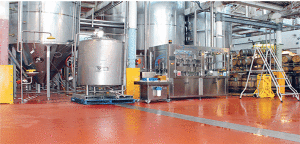
Cracked, broken or ‘ale-ing’ floor surfaces can spell disaster for brewing companies by introducing the possibility of contamination issues, an Australasian flooring specialist company is warning.
Cracked, broken or ‘ale-ing’ floor surfaces can spell disaster for brewing companies by introducing the possibility of contamination issues, an Australasian flooring specialist company is warning.
Add in the movement of bulky barrels, warm conditions, heavy equipment and the potential spillages of corrosive by-products, and insufficiently robust floor coatings could critically fail, Flowcrete Australia says.
“The Australasian brewery industry has to safely and effectively manage the large-scale and complex operations of a $4.3 billion industry, where 600 tonnes of domestically grown hops have to be turned into enough high-quality beer to meet 93% of consumption,” Flowcrete managing director Sean Tinsley says.
“To achieve this requires facilities that can cope with exceptionally large volumes of produce and a high turnover rate.”
The company is so concerned about assisting the brewery industry to understand the criteria that floors need to provide in order to meet regulations such as the Australia New Zealand Food Standards Code or to implement an effective Hazard Analysis and Critical Control Points (HACCP) Food Safety Management System, that it has created a new whitepaper to ensure the floors beneath brewers’ feet are able to maintain an effective surface that will support the site’s activity safely, hygienically and long-term.
The whitepaper explores the pros and cons of epoxy resin and polyurethane systems, two of the most common types of brewery floors, examining how they fare when faced with specific demands and how they can be tailored to support the site’s daily operations.
The whitepaper also highlights the importance of choosing HACCP standard building materials that will assure regulatory bodies, clients and consumers that the beer has been produced within a facility that adheres to the highest hygiene principles.
This flooring ethos was exemplified recently at the new White Rabbit Brewery in Geelong, Victoria, which installed a bright coral red, antimicrobial-enhanced, polyurethane coating in its brewery area to meet the site’s practical, hygienic and aesthetic requirements. It was imperative for White Rabbit to be able to easily keep the production area looking fresh, inviting and unblemished, as visitors would be taking tours around the open-plan brewery.
Around 400 sq metres of Flowcrete Australia’s HACCP International certified food-grade flooring range was installed within White Rabbit’s brewery. The bactericidal additive Polygiene is incorporated within every Flowfresh system, empowering it with the ability to eliminate up to 99.9 per cent of bacteria in contact with the floor.
Polyurethane flooring materials can be used to create finishes able to withstand whatever the beer production process can throw at it, Flowcrete says. “The seamless, impervious nature of polyurethane floors combined with the ability to incorporate coving and drainage also means that brewery operators can quickly and easily wash away the grains, grime and dirt that accumulates during a busy working day,” Tinsley says.


































































































